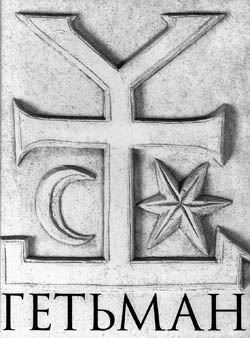History of Mazepa’s time
The Tempora Publishing House produces a unique two-volume edition
Nearly all outstanding historical figures, and Ukraine is no exception here, have one feature in common. People may curse or adore them, sincere honor or hate them, but they are never treated with cold indifference.
The example of Ivan Mazepa or the perception of his deeds, ideas and life, to be more precise, is vivid proof of this regularity. No one feels indifferent towards him. For this reason, hardly anyone will be indifferent to the new splendid gift prepared for all admirers of Ukrainian history and culture by the Kyiv-based Tempora Publishing House, which has released the two-volume edition entitled Hetman (Vol.1 – Shliakhy; The Roads, Vol.2 Osmyslennia; Interpretation). This is a real encyclopedia of Mazepa studies, the first one of its kind in present-day Ukraine.
The merit of this creative victory of the authors — these are such well-known figures to The Day’s readers as Volodymyr Panchenko, Olha Kovalevska, Serhii Pavlenko, Oleksii Sokyrko, Oleksii Kresin, Viacheslav Stanislavsky, Olena Dziuba, Oleh Odnorozhenko, Larysa Vynohorodska, the brilliant artist Serhii Yakutovych, and the film director Yurii Illienko — is undoubtedly huge. I cannot but stress that Yulia Oliinyk, who heads the Tempora Publishing House, has played a special role in shaping the idea of this book, and what is most important, in its realization. The splendid two-volume edition, designed by Mykola Koidan, would never see the light of day if it was not for the energy of this person, her will, and her commitment. The launch of the book took place on December 8 in the bookstore Ye.
What is particularly attractive in this book is that it does not merely retell the Ukrainian history of Mazepa’s times but presents the material side of it. Not only is it possible to perceive and understand it, but imagine, feel it (thanks to a huge number of illustrations), and “touch” it. Sokyrko believes that this is the format of presenting history that we acutely lack these days, whereas Kresin regards it as an extremely unified collection. At first sight, it looks multicolored, even mosaic, but its colorfulness is that of life and cognition.
Here the difficulty is posed by the desire of the broad audience (and the book belongs to the popular science category) to get the answer in the familiar range, which has been known to present-day readers for quite a while. Generally, a popular science publication should give answers in view of the existing myths and stereotypes. But it should also overcome them.
Volodymyr Panchenko, professor at Kyiv Mohyla Academy and The Day’s regular conrtibutor and friend, played a leading role in creating the second volume of Hetman, which tells about Mazepa as a cultural hero. He noted that Mazepa’s mission, role, and reception in the cultural world is a special phenomenon, and it is unknown whether there are any analogues in the world. The book explores this phenomenon in several dimensions: Mazepa – Ryleev, Mazepa – Pushkin (pages dedicated to the famous poem Poltava are riveting), Mazepa – Gogol, and Mazepa – Shevchenko. Besides, it explores Mazepa’s role in painting, music, theater, and cinema.
What concerns the first volume, The Roads, it is dedicated to the analysis of the hetman’s biography, the prominent people of his time, as well as the history of Ukraine’s neighboring countries.
Oliinyk underlined that the team of authors sought to create a book about Mazepa, first and foremost, as one of the brightest state-builders in our history. This aspect is especially relevant today in attitudes to Mazepa, and this design is clearly a success. That is why it is easy to see that Hetman will be read many years, or perhaps even decades, from now.






